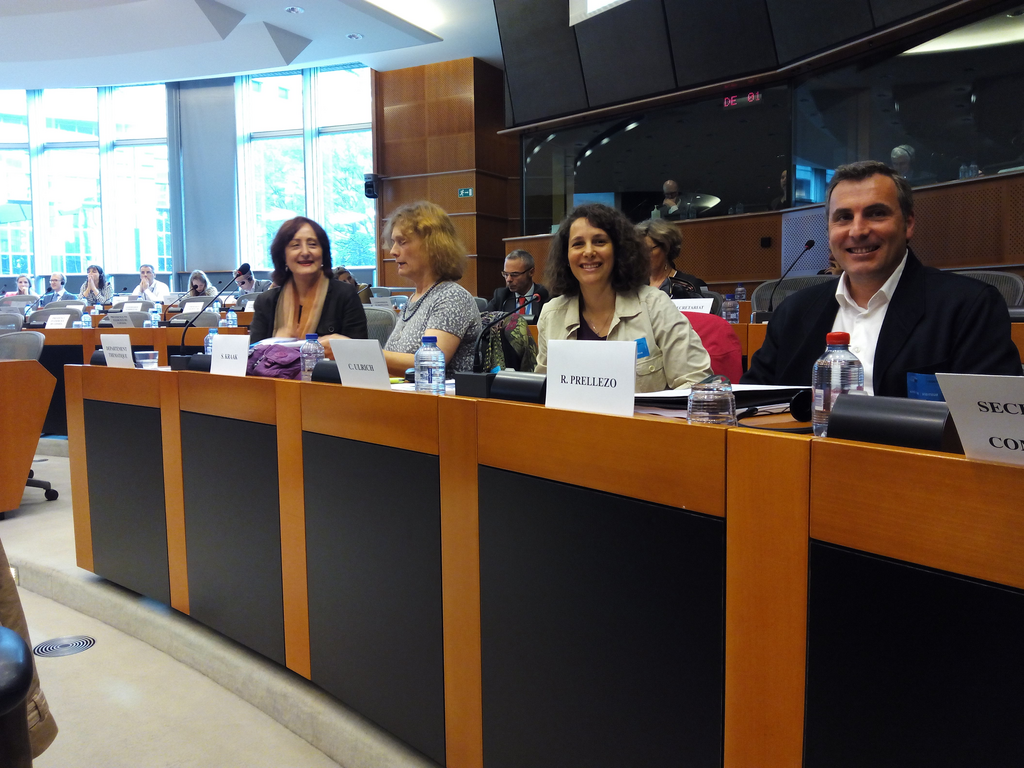The Fisheries Committee of the European Parliament received presentations on the overall findings and three case studies, conducted by Thünen for the Baltic Sea, DTU-Aqua (Denmark) for the North Sea and AZTI (Spain) for the Bay of Biscay. The three studies are published together, preceded by a brief synthesis and comparison between the three. Dr. Sarah Kraak and her two colleagues presented the three studies on 16 June in Brussels.
The Baltic Sea report looks at the issues from a number of different directions. In the first chapter it is noted that the international multispecies modelling exercises that had been carried out in 2011 and 2012 had led to the conclusion that maximum sustainable yield can be achieved in an infinite number of ways, ranging from a system with high cod catches and low herring and sprat catches to a system with low cod catches and high herring and sprat catches. The choice for any one of these possible outcomes cannot be made on scientific grounds but is a political one; each choice will have different winners and losers, since some countries depend more on the cod fisheries while others depend more on the pelagic fisheries. Since 2012 no agreement had been reached. Our report tries to be helpful by the suggestion to narrow the range of options down by adding another objective: for example, keep the cod quotas constant from year to year while the pelagic quotas are allowed to fluctuate. This objective would accommodate the fact that the cod fisheries are generally more dependent on the Baltic quotas than the pelagic fisheries are; the latter would be better able to cope with fluctuating quotas. The report illustrates this suggestion with a worked quantitative example.
The report has an extensive section on recreational fisheries. Annually there are up to 1 million recreational fishers active in the Baltic Sea. Of the total cod catches, 25% are estimated to be taken by the recreational fisheries. The report stresses the importance of collecting data on these catches, which are needed for accurate stock assessments and management. Nevertheless, many national surveys are lacking or incomplete. In fact only German data are currently included in the cod stock assessment. The report highlights the economic and social importance of the recreational fisheries: in Germany recreational fishers spend €112 million, mainly in coastal communities, in shops, hotels, and restaurants, and on boat and equipment rentals, charter boats and fishing guides. Clearly, management needs to balance the interests of the recreational and the commercial fisheries.
In the chapter on the impact of the discard ban on the ecosystem we discuss the effect on scavenging seabirds that feed on discards, for example the herring gull. We conclude that the impact will be small, because the biomass that will be additionally landed owing to the discard ban, and thus removed from the sea and not available to scavengers anymore, amounts to only about 2% of the current total landings in the Baltic Sea. Moreover, owing to the obligation to gut all cod larger than the MCRS (Minimum Conservation Reference Size) at sea, the amount of offal available to scavengers is substantial and is estimated to be about half the weight of the current cod discards.
Another chapter discusses other anthropogenic factors than fishing, for example eutrophication, pollution, climate change and introduced species, that have an impact on the ecosystem and the status of the stocks.
The last chapter deals with implementation error. Implementation error occurs when the intended aims of a regulation fail to materialize, for example because of insufficient enforcement, low compliance, or because the regulations do not sufficiently trigger the fishers to produce the intended behaviour. The new CFP, with what are essentially catch quotas rather than landing quotas, can only be fully implemented when all catches are accounted for. We propose a quid-pro-quo or tiered approach, which can be taken at vessel level, fleet-segment level, or Member-State level. According to this approach, the vessel, fleet, or Member State can choose to take on the burden of a Fully Documented Fishery (FDF), e.g. by CCTV, and have their full quotas available to them, or not to take on this burden and ‘pay’ for the resulting uncertainty about their true catches by having an uncertainty margin subtracted from their quotas. The chapter digs into the psychology of voluntary compliance and the intrinsic motivation to fish sustainable. These are undermined by top-down control, complex regulation, lack of trust, and monetary incentives, while these are enhanced by providing the fishers with the possibility to self-select into small groups with a certain degree of self- decision.
The Report can be downloaded here
A Video from the presentations is available here

![[Translate to English:] [Translate to English:]](/media/_processed_/d/7/csm_Startseite-OF_03_c0dfd6e750.png)
![[Translate to English:] [Translate to English:]](/media/_processed_/a/3/csm_20181116-151457-Stella-Jerome-Fischfalle-Warnem%C3%BCnde-Dorsche-im-Netzk%C3%A4fig-5691_heller_3050c72fa2.png)

![[Translate to English:] Logo des Bundesministerium für Ernährung und Landwirtschaft](/media/allgemein/logos/BMEL_Logo.svg)